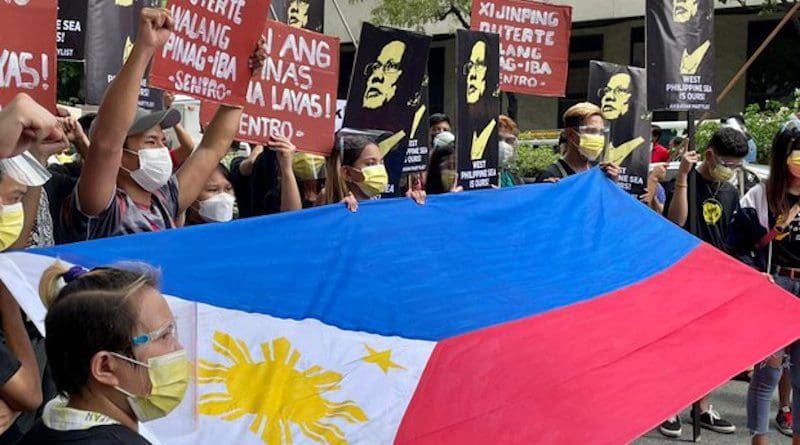Philippines: Asia Cannot Afford South China Sea War
By BenarNews
By Marielle Lucenio
Asia cannot afford to go to war over territorial rivalries in the South China Sea, the Philippines Defense Secretary said Wednesday ahead of a visit by his new U.S. counterpart to Southeast Asia next week.
Delfin Lorenzana is expected to discuss South China Sea-related issues when he and American Defense Secretary Lloyd Austin meet in Manila on July 29 and 30 after Austin visits Singapore and Vietnam, the first trip to the region by a top official in the Biden administration.
“[E]ven if there are intensifying exercises between the U.S. and its allies in the region, I do not believe that this is in preparation for war over the South China Sea,” Lorenzana said, referring to recent naval maneuvers in the disputed waterway.
“For one simple reason: that there are major trade [routes] coming from China, and according to the World Bank, more than U.S. $6 trillion worth of goods pass [through] that place, [in the] South China Sea every year,” Lorenzana said.
He was speaking during a forum previewing next week’s State of the Nation address by President Rodrigo Duterte. It will be the Philippine commander-in-chief’s last annual speech to Congress before his term expires in 2022.
Manila and Washington are bound by a 70-year-old Mutual Defense Treaty (MDT), which calls on both parties to come to each other’s military aid if one of the two longtime allies comes under attack.
“There is a provision in the MDT that an attack to one is considered an attack to the other,” Lorenzana said.
The Philippines, Lorenzana said, would abide by the treaty even though invocating it in any degree would have to pass through the legislature “before we participate in any conflict in the South China Sea.”
On July 12 – the fifth anniversary of a landmark international arbitral court ruling that went in Manila’s favor and rejected China’s territorial claims in the waterway – U.S. Secretary of State Antony Blinken declared that Washington would invoke the mutual treaty if Philippine military or civilian ships or aircraft were attacked in the South China Sea.
That same day, China’s foreign ministry dismissed the 2016 ruling by the Permanent Court of Arbitration as “a piece of waste paper.”
On Monday, Austin tweeted about his upcoming Asian trip.
“Strong alliances & partnerships are key to supporting a rules-based order in the Indo-Pacific. That’s why I’m visiting Singapore, Vietnam, & the Philippines,” he said via Twitter.
Both the U.S. and rival superpower China are competing for influence among countries in Southeast Asia.
“Throughout his trip, Secretary Austin will meet with key leaders to reaffirm defense relationships and conduct bilateral meetings with senior officials. Secretary Austin’s visit will demonstrate the importance the Biden-Harris Administration places on Southeast Asia,” Pentagon spokesman John F. Kirby said in a statement Monday.
In the Philippines, Hermogenes Esperon, Duterte’s national security adviser, emphasized that the government would not stop in protecting its “territorial integrity.”
“We continue to optimize the deployment of all our assets to protect our maritime domain, and allow our fishermen unhampered fishing access to our fishing grounds,” Esperon said during the same forum on Wednesday.
The military, coast guard and maritime police have been providing support to fishermen as well as marine scientists studying the sea region, according to Philippine defense and security officials.
The Philippines occupies nine islands and areas in the South China Sea, the largest of which is Pag-asa (Thitu) Island, where the military has been constructing an improved airstrip and port. The Philippines, meanwhile, has complained about the presence of scores of Chinese ships – including ones that Manila described as Chinese militia boats – in waters inside its exclusive economic zone.
Visiting Forces Agreement
Lorenza said he expected to discuss the Visiting Forces Agreement (VFA) along with the MDA and other South China Sea concerns with Austin.
Duterte ordered the VFA repealed in February 2020 because he was angered by a Washington decision to bar his former national police chief – the top enforcer of his administration’s war on drugs that has led to thousands of deaths – from traveling to the United States.
In the face of China’s continued aggression in the region, Lorenzana and other foreign policy officials prevailed on Duterte to reconsider and allow an extension of the pact that would expire this year.
The VFA, signed in 1998, provides legal cover for large-scale joint military exercises between Washington and Manila.
On Wednesday, Lorenzana said the VFA would not be scrapped, although certain provisions would have to be amended.
“I am confident that this will be signed under President Duterte,” he said.
Jojo Riñoza in Manila contributed to this report.

